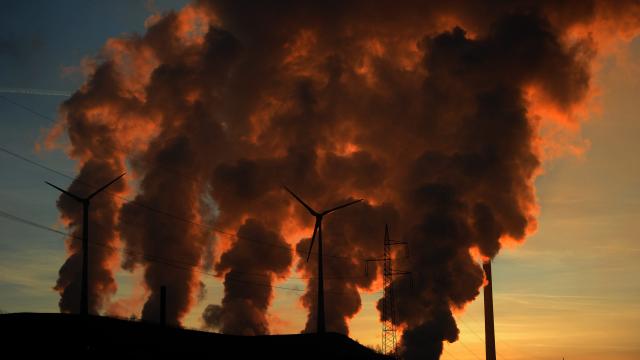We’re long past the era of having nice things, and that’s doubly true when it comes to the climate. So it’s fitting that even on a day when there’s a bit of good news about coal’s decline, we also learned that greenhouse gases in the atmosphere hit a new peak.
The rollercoaster of emotions comes courtesy of two reports from the World Meteorological Organisation (WMO) and climate analysis and journalism outfit Carbon Brief. Respectively, they show that atmospheric concentrations of carbon dioxide and other dangerous greenhouse gases have never been higher in human history, but that global coal saw its single biggest year-over-year decline this year. So many feelings!
Let’s start with the WMO report, which is the bad news one and looks at what happened to our atmosphere in 2018. Carbon dioxide levels peaked higher than 407 parts per million (ppm) last year, high enough for a new record.
For reference, they stood around 280 ppm at the start of the Industrial Revolution. Since then, humanity’s fateful experiment of burning fossil fuels for energy has sent them spiralling higher with each passing year. The rate of change has quickened thanks to the unfortunate tethering of burning fossil fuels with economic growth.
Nitrous oxide and methane, two other greenhouse gases even more potent than carbon dioxide, also hit new highs in 2018. The only greenhouse gases to decline are some chlorofluorocarbons or CFCs. The main reason they’re declining is thanks to the Montreal Protocol that began a process in the late 1980s to phase them out due to their ozone-depleting properties. The choice to stop using them has nothing to do with climate change so basically the only greenhouse gases in decline are doing so thanks to a happy coincidence.
The Carbon Brief report does offer the faintest glimmer of hope amidst the WMO’s doom and gloom. It shows that the use of coal, one of the most polluting forms of fossil fuels, dropped 3 per cent in 2019. That represents the single biggest year-to-year drop in coal use on record in the BP Statistical Review of World Energy, which dates 1985.
A dip in coal is undeniably good climate news The drop is largely due to the faltering economics of coal, which is a more costly form of energy than renewables or natural gas in much of the world. In the U.S., for example, it would be profitable to shut down nearly every coal plant in the country and replace them with renewables.
The same economics have led coal use to fall below renewables in the UK, the birthplace of the Industrial Revolution and by extension, climate change. And indeed, the U.S. and European Union are most responsible for the 2019 dip in coal use globally.
Coal generation dropped in those places by 324 terawatt hours. Factoring that in with rises in China, Vietnam, and other developing countries in Asia in particular and overall coal use was down 303 terawatt hours.
Rising coal use in Asia dampens the good news a bit as does the fact that the world coal use is still more than two-and-a-half times higher than it was in 1985. And projections for the future supply side of coal and other fossil fuels are rosy, which means the outlook for the climate is decidedly not.
Despite the small dip in coal, the WMO report chronicling 2019’s atmospheric greenhouse gas situation will show exactly what the 2018 report shows: The world will set a new record. That’s because even if by chance there’s a dip in over all emissions, we’re still pumping up an unheard of amount of greenhouse gases into the atmosphere every year from burning fossil fuels, agricultural practices, and other human activities. And so until the world brings emissions down to zero, it’ll keep setting atmospheric greenhouse gas records.
Against this backdrop, it’s hard to get too hype about incremental drops. That’s particularly true given the fact that there’s a very limited amount of time to draw down emissions and avert the worst effects of climate change.
